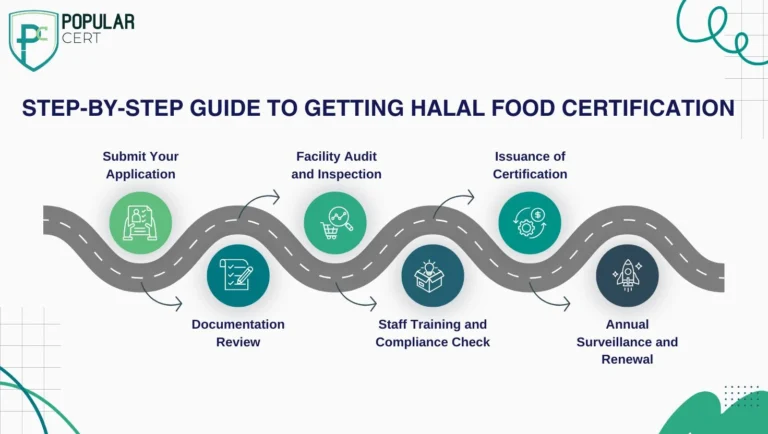How to Get Halal Food Certification in the Philippines: Step-by-Step Guide

Introduction – The Importance of Halal Certification in the Philippines
To answer those needs, halal food certification in the Philippines is vital for meriting value and trust along with regulatory compliance for food businesses and offers an efficient gateway toward penetrating foreign markets while reinforcing local business operations. Whether you service local Muslim clientele or are looking to expand into the Middle East and Southeast Asia, halal certification will set your business apart and enable sustainable growth.
In this document, you will find all information relating to HALAL Certification In Philippines, including its meaning, benefits, certifying agencies, and step-by-step instructions on how to get one.
What Is Halal Food? The Fundamentals
Understanding The Meaning Halal
“Halal” is a term that denotes permissible in Arabic. With regards to food, it showcases products that are allowed as per the Islamic law as guided in the Quran. To be deemed halal, the food must:
- Absence of forbidden (haram) substances such as pork and alcohol
- Be processed in a clean, uncontaminated environment
- Adhere to specific slaughter and preparation rituals
- Common Ingredients That are Considered Halal and Non-Halal
Halal Ingredients Include:
- Fruits, vegetables, grains, and legumes.
- Poultry, beef, and lamb that have been halal-slaughtered.
- Additives and flavorings from plants.
Non-Halal Ingredients are :
- Pork and its Derivatives.
- Alcohol (even in small amounts).
- Animal-derived enzymes or gelatin not from halal sources
Why Should One Get a Halal Food Certification in the Philippines?
- Builds Trust Among Muslim Customers Muslim communities – especially in Mindanao – actively look for halal-certified products. Certification demonstrates that your business holds their beliefs in high regard and accommodates their dietary requirements.
- Gain Access to Other Global Halal Markets Halal certification gives you the opportunity to export goods to Muslim-majority nations such as Malaysia, Indonesia, Saudi Arabia, and the UAE. Many importers demand halal certification prior to accepting goods.
- Ensures Better Food Safety and Hygiene Practices Halal standards observe the highest levels of cleanliness, smell and trims halal meat, has high-level traceability, and entails rigorous hygiene. Certification fosters encourage food best practices compliant with GMP and ISO 22000.
- Helps Achieve Market Differentiation In a saturated food sector, the halal logo provides your brand with visibility as well as assurance of ethical and quality practices.
Types Of Certification
- ISO Certification
- ISO 9001 Certification
- ISO 14001 Certification
- ISO 45001 Certification
- ISO 22000 Certification
- ISO 27001 Certification
- ISO 17025 Certification
- ISO 13485 Certification
- ISO 20000-1 Certification
- ISO 22301 Certification
- ISO 50001 Certification
- ISO 37001 Certification
- IATF 16949 Certification
- ISO 29001 Certification
- ISO 31000 Certification
- ISO 20121 Certification
- ISO 10002 Certification
- ISO 41001 Certification
Get Free Consultation
Our Clients


















Who Requires The Halal Certification?
Every type of business such as the following need it:
- Food and drink producers
- Caterers and restaurants
- Food exporters and packers
- Cosmetics and pharmaceuticals containing food grade ingredients
Businesses both small scale and large scale exporters benefit from halal certification and Muslim consumers have come to expect these products.
Halal Certification Bodies in the Philippines
Recognized Certifying Authorities
These bodies have been issued with prerogatives for halal certification within the country and are recognized worldwide:
- Islamic Da’wah Council of the Philippines (IDCP)
- Halal Development Institute of the Philippines (HDIP)
- Halal International Chamber of Commerce and Industries of the Philippines (HICCIP)
- Government Oversight
The National Commission on Muslim Filipinos (NCMF) ensures the reliability and credibility of halal certification. NCMF also functions alongside the Halal Export Development and Promotion Board which encourages halal compliance within the export sectors.
Step-by-Step Guide to Getting Halal Food Certification
Getting certified may sound complex, but with the right partner, it becomes a clear and manageable process.

Step 1: Submit Your Application
- Select a halal certifier from the list of approved ones.
- Complete the application form, and include your company name, products, and description of raw materials and processes.
Step 2: Documentation Review
- The certifier audits your supply chain, ingredients, and processes to ensure regulatory compliance.
- Non-compliant items must be removed or replaced.
Step 3: Facility Audit and Inspection
- On-site audit by Islamic auditors.
- Facilities examined include production and storage areas, packaging, and overall hygienic conditions.
- Equipment must be cleaned or set aside if contaminated with haram substances.
Step 4: Staff Training and Compliance Check
- All employees need to receive training on halal handling and separation procedures.
- The certifiers may assist with implementing systems and corrective actions.
Step 5: Issuance of Certification
- Your Halal certificate can be issued once all requirements are met.
- You are now permitted to utilize the halal logo on your packaging and other marketing materials.
Step 6: Annual Surveillance and Renewal
- Surveillance audits will be conducted annually for the first year the certification is issued.
- Failure to adhere to the terms of your certification may result in suspension or revocation.
Key Benefits of Having a Halal Certification
- Capture the international halal market.
- Meet foreign import requirements.
- Gain trust and build brand loyalty from Muslim customers.
- Improve hygiene and documentation practices.
- Expand the operations in the fast-growing halal economy.
Challenges and Overcoming Them
What Not To Do
- Failing to segregate halal and non-halal production equipment.
- Not educating personnel on halal standards.
- Improper record-keeping and traceability.
- Mislabeling of ingredients or sources.
Tips for Achieving Successful Certification
- Engage with halal consultants, for example, Popularcert.
- Purchase from halal-certified ingredient suppliers.
- Have regular self-audits for compliance.
Popularcert: Hassle Free Halal Certification
At Popularcert, we guide Philippine companies through the halal certification with ease. We offer:
- Support for documentation and auditing
- liaising with accredited halal certifiers
- pre-audit inspections and staff training.
- Also offered are post-certification continuous compliance monitoring and support.
We balance cost and offer international recognition for all manufacturers, whether SMEs or large scale, assuring smooth processes.
Ready to get certified?
Certification unlocks opportunities in faith, food integrity, safety, and earning trust – Popularcert certifies standards and expands market potential.
Contact Popularcert today to be listed in the millions.
GET A FREE CONSULTATION NOW
FAQs
Is halal certification mandatory in the Philippines?
Marking options are voluntary for all – but critical for businesses servicing Muslim clientele or targeted as exports.
How long does certification take?
Certification periods are generally of 2 – 6 weeks, with submission and readiness determining the pace.
How much does halal certification cost?
Pricing is determined per company size and product range. Popularcert suggests initial consultations tailored to needs at low prices.
This certificate will allow me to export to Malaysia or Saudi Arabia, correct?
Absolutely, as long as the issuing body of your certificate is recognized by foreign halal authorities.
What action could I take to help address failing an inspection?
You will need to resolve non-conformities first, after which you will be allowed to re-inspect. Hiring consultants helps to mitigate time delays.
